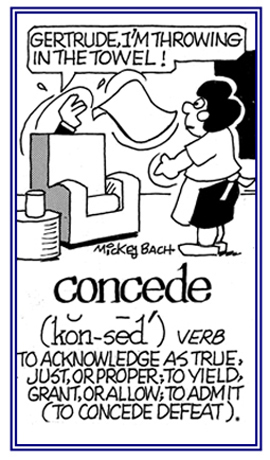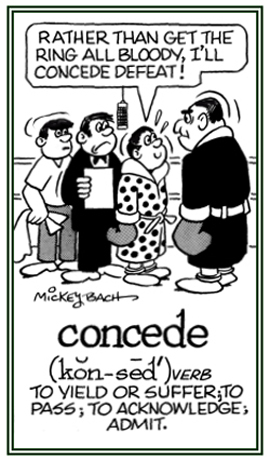-cede, -ceed, -cess, -cease
(Latin: to be in motion; to go, to go away, to yield, to give up, to withdraw)
antecede (verb), antecedes; anteceded; anteceding
To go before, in time, order, rank, etc.; to precede.
1. The act of going before.
2. The act of preceding in time or order.
3. A reference to occurring before or in front of something else; in time, place, rank, or sequence.
2. The act of preceding in time or order.
3. A reference to occurring before or in front of something else; in time, place, rank, or sequence.
1. Something that happens or exists before something else.
2. A word or phrase that a subsequent word refers to; such as, "Joe" is the antecedent of "him" as in the sentence: "We will give this to Joe if we see him."
3. Someone's ancestors.
4. A personal history of someone; such as, the events or circumstances in a person's past: "She has done very well for herself, considering what is known about her antecedents."
2. A word or phrase that a subsequent word refers to; such as, "Joe" is the antecedent of "him" as in the sentence: "We will give this to Joe if we see him."
3. Someone's ancestors.
4. A personal history of someone; such as, the events or circumstances in a person's past: "She has done very well for herself, considering what is known about her antecedents."
anteceding
Aut disce aut discede.
Either learn or leave.
A good motto (among many mottoes) for any school that has serious educational principles, as well as being financially well endowed, so it can afford to enforce such a motto.
1. Any method for producing commercially useful biological material.
2. A method or operation of preparing a biological material; especially, a product of genetic engineering, for commercial use.
2. A method or operation of preparing a biological material; especially, a product of genetic engineering, for commercial use.
cease (verb), ceases; ceased; ceasing
1. To put an end to or to stop doing something.
2. To come to an end or to discontinue an activity.
3. Etymology: from Old French cesser which came from Latin cessare, "to cease, to go slowly"; from cedere, "to go away, to withdraw, to yield"; originally, "to go, to leave".
2. To come to an end or to discontinue an activity.
3. Etymology: from Old French cesser which came from Latin cessare, "to cease, to go slowly"; from cedere, "to go away, to withdraw, to yield"; originally, "to go, to leave".
ceaseless
1. Uninterrupted in time and indefinitely continuing over a long period without a pause or an end.
2. Without stopping or pausing; unending; incessant.
2. Without stopping or pausing; unending; incessant.
cede (verb), cedes; ceded; ceding
1. To relinquish possession or control over someone or something.
2. To give over; to surrender or to relinquish to the physical control of another person.
3. To surrender or to give up something; such as, land, rights, or power, to another country, group, or person.
4. Etymology: from Latin cedere, "to yield"; originally, "to go, to leave".
2. To give over; to surrender or to relinquish to the physical control of another person.
3. To surrender or to give up something; such as, land, rights, or power, to another country, group, or person.
4. Etymology: from Latin cedere, "to yield"; originally, "to go, to leave".
1. A stop, pause, or interruption; especially, a permanent discontinuation.
2. A temporary or complete stopping; a discontinuance: "There was a cessation of hostilities between the two nations."
3. Etymology: from Old French cessation, from Latin cessationem, cessatio, "a delaying, ceasing", from Latin cessare, "to delay" directly related to cease, from Latin cessare, "to delay, to stop".
2. A temporary or complete stopping; a discontinuance: "There was a cessation of hostilities between the two nations."
3. Etymology: from Old French cessation, from Latin cessationem, cessatio, "a delaying, ceasing", from Latin cessare, "to delay" directly related to cease, from Latin cessare, "to delay, to stop".
This was derived from cessus, the past participle of cedere, "to go away, to withdraw, to yield".
1. The act of giving up something; such as, power, land, or rights to another person, group, or country: The law required the cession of the property to Jacob's heirs.
2. Etymology: from Old French cession, from Latin cessionem, from cess-, stem of cessare, "to yield".
2. Etymology: from Old French cession, from Latin cessionem, from cess-, stem of cessare, "to yield".
A following of one thing or person after another in time: Jane was new in the huge family of eleven people, so she wrote down the names in chronological succession starting with the oldest of the children to the youngest.
concede (verb), concedes; conceded; conceding
1. To admit or to acknowledge something, often grudgingly or with reluctance: Jane thought it would be best to concede to her mother that she had eaten some cake before dinner, even though she was on a diet to reduce her weight.
2. To allow, surrender, relinquish, or to yield control; such as, a right or privilege to another person, organization, or country: After serving as a secretary in the company for two years, Doris was going to concede her position to another member of her department.
3. To accept and to acknowledge defeat in a contest, debate, election, or fight; often without waiting for the final result or decision: As soon as the political candidate recognized that she would not win the election, she decided to concede her loss and so she gave a short good-bye speech.
4. To allow an opponent or opposing team to gain something valuable; usually, a goal or points: While playing chess, Tim made up his mind to concede the game to his rival, who was able to win with a checkmate.
5. Etymology: from Latin concedere, "to give way, to yield"; from com-, "together, with" + cedere, "to go, to grant, to give way"

© ALL rights are reserved.

© ALL rights are reserved.
Go to this Word A Day Revisited Index
2. To allow, surrender, relinquish, or to yield control; such as, a right or privilege to another person, organization, or country: After serving as a secretary in the company for two years, Doris was going to concede her position to another member of her department.
3. To accept and to acknowledge defeat in a contest, debate, election, or fight; often without waiting for the final result or decision: As soon as the political candidate recognized that she would not win the election, she decided to concede her loss and so she gave a short good-bye speech.
4. To allow an opponent or opposing team to gain something valuable; usually, a goal or points: While playing chess, Tim made up his mind to concede the game to his rival, who was able to win with a checkmate.
5. Etymology: from Latin concedere, "to give way, to yield"; from com-, "together, with" + cedere, "to go, to grant, to give way"


Go to this Word A Day Revisited Index
so you can see more of Mickey Bach's cartoons.
1. An act or an example of yielding or compromising in some way, often grudgingly or unwillingly: Despite wanting an informal celebration, Mr. Simmons, as a concession to his wife, reluctantly agreed to go out to dinner with friends to celebrate her birthday instead of staying home.
2. A privilege, right, kindness, etc. that is granted to a person or group, usually as a result of special circumstances: The university granted a concession to three visually impaired students who required the assistance of a personal reader so they could complete their final examinations.
3. A space or privilege within certain premises for a subsidiary business or service: Jerry had a refreshment concession at the local movie theater.
4. Something acknowledged or admitted: The land survey and the farmer's long held belief about land boundaries differed and the farmer granted the concession that the survey was correct and so he withdrew his complaint about errors that were made prior to the sale of his land.
5. Etymology: from Latin concessionem, from concessius, past participle of concedere, "to go, to grant, to give way".
2. A privilege, right, kindness, etc. that is granted to a person or group, usually as a result of special circumstances: The university granted a concession to three visually impaired students who required the assistance of a personal reader so they could complete their final examinations.
3. A space or privilege within certain premises for a subsidiary business or service: Jerry had a refreshment concession at the local movie theater.
4. Something acknowledged or admitted: The land survey and the farmer's long held belief about land boundaries differed and the farmer granted the concession that the survey was correct and so he withdrew his complaint about errors that were made prior to the sale of his land.
5. Etymology: from Latin concessionem, from concessius, past participle of concedere, "to go, to grant, to give way".
concessive
1. The right to use land or other property for a specified purpose, granted by a government or other controlling body.
2. A commercial operation set up within the premises of a larger concern.
2. A commercial operation set up within the premises of a larger concern.


